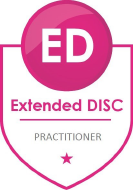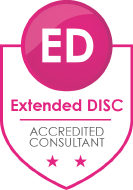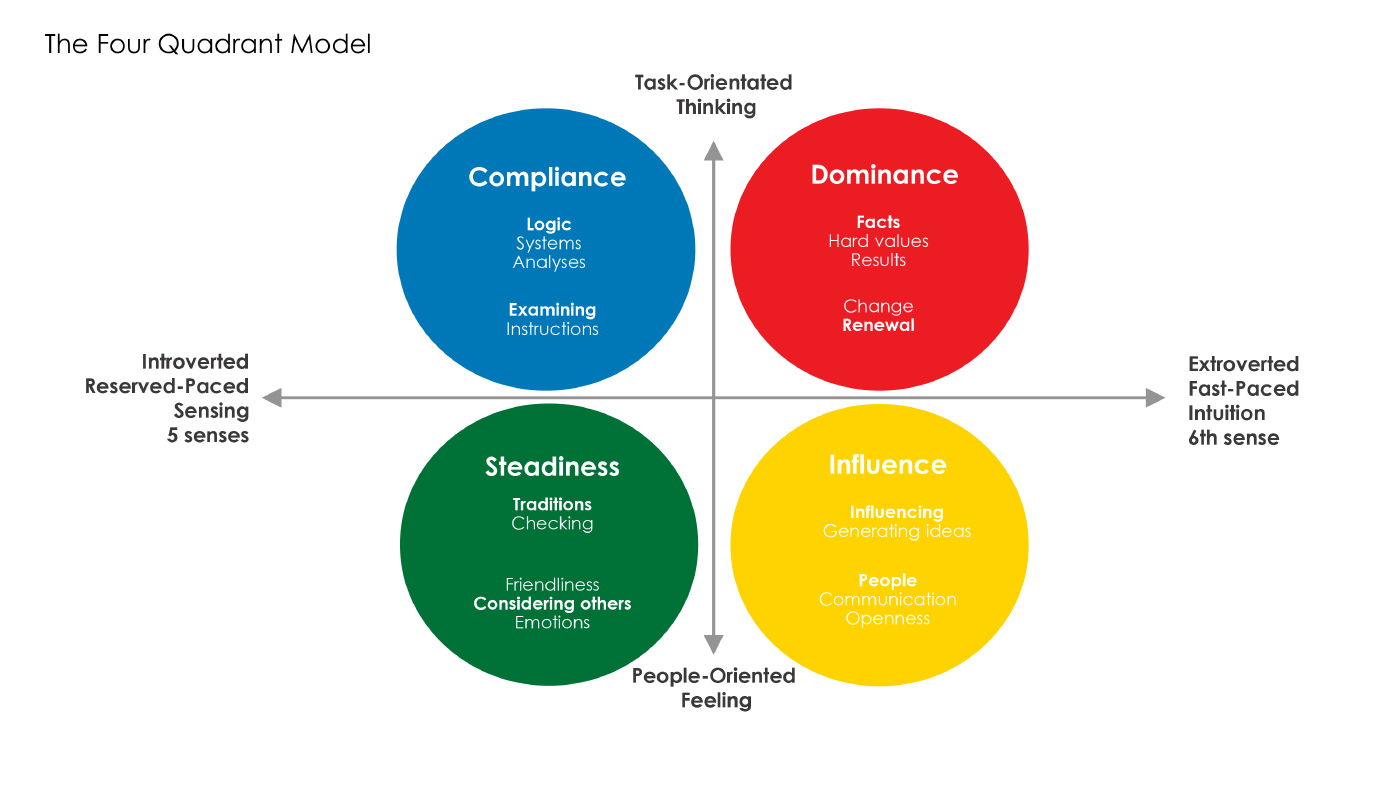

What is Extended DISC?
Extended DISC is a behavioural assessment that measures how an individual prefers to interact with others at work.
A DISC profile provides an easy-to-understand explanation of the way people tend to interact with their colleagues. The report describes an individual’s:
- decision-making style
- preferred means of communication
- general behaviour in a workplace environment
- motivators and de-motivators
- preferred work environment
- causes of stress and signs of stress
DISC is a behavioural tool, not a personality profile. It is not an analysis of intelligence or ability – but rather an assessment of a person’s natural behavioural tendencies in the work environment.
Why use DISC?
Behaviour is observable and it is modifiable.
DISC creates a common language and a self-awareness to better understand ourselves and others. It can be a powerful tool in a wide range of applications such as team building, recruitment, learning and development and career planning.
Our clients use DISC with their employees to equip them with skills to become more successful by:
- understanding how people are different
- developing confident self-awareness
- learning to identify the styles of others
- modifying behaviour based on the other person’s style
Behaviour is a powerful and accessible way to look at how people work for two reasons: Whatever else is going on beneath the surface, it is our behaviour that other people experience. By focusing on behaviour, not the complex space of personality, change is more achievable.
Some behaviours we can find very difficult to change and may need deeper analysis and thought through the likes of personality profiling and psychological consideration, however many workplace behaviours are surprisingly easy to change. They are not so much deeply held needs as default or natural ways of doing things that have evolved over time. If we see value in changing behaviours, we are likely to do so.
Significant progress in individual and team performance can be achieved by focusing on behaviour.
How it helps individuals
DISC helps us to understand how we behave and explains how we react spontaneously when we don’t have time to consider consequences. The reports are also useful to the individual when dealing with communication challenges or helping them to understand why certain situations put them under pressure.
Constructive change begins with self-knowledge. DISC profiles show an individual how they respond to conflict, what motivates them or stresses them out, their natural communication style, what they value most and how they solve problems.
Enquire about DISC assessments today
Talk to us about how Extended DISC can enhance your team’s performance.
How it helps teams and culture
Self-Awareness and awareness of others are crucially important in the team environment. Not only does this allow for a culture of cohesion, it also helps build tolerance of each other and a shared understanding.
The team report combines all the individual assessment results into one report. It shows the team dynamics, the strengths and development areas of the team, and illustrates how the team members are adjusting their behaviours in the existing work environment.
Some of the most common applications for Team Analysis are:
- Team building and development
- Ensuring team roles align with team members strengths
- Strategic decision making
- Identification of the effective behaviours
- Leadership development
- Understanding complex issues
- Organisational development
- Succession planning
- Turnover reduction
- Conflict Resolution
How is DISC used as a recruitment tool?
DISC Recruit Assessments provide you with an understanding of an individual’s natural behavioural style and the types of tasks and activities they feel comfortable undertaking as well as identifying their development areas. This is hugely valuable when evaluating job and team fit for a role.
To appoint the most suitable candidate for the position, consider these important factors:
- How the candidate is likely to behave in the job?
- How does the candidate communicate?
- What are the candidate’s motivators?
- What is the candidate likely to avoid?
- Who is the ideal manager for this candidate?
- Do they have the reasoning capacity relative to the job requirements?
- Will they fit in with the team?
We know that a candidate can present at an interview in the way they feel is most relevant for the role as they ‘sell themselves’ to you. But the reality can be very different and DISC helps you reach a good recruitment decision.
Reasoning assessments
Also called aptitude or intelligence tests. These are designed to assess the capacity or skill of an individual to perform specific tasks related to success in a job role.
Although skills can be developed, at least to some extent, a person with developed reasoning skills is likely to function more effectively in tasks requiring reasoning skills.
There are 9 individual tests available, each measuring a different element of a person’s reasoning skills. We recommend a candidate complete no more than 3 of the following at any given time:
- Abstract Logical Reasoning
- Understanding Logical Process
- Spatial Reasoning
- Understanding Social Context
- Numerical Reasoning
- Mathematic Logical Reasoning
- Word Association
- Visual Memory Verbal Reasoning
- Verbal Reasoning measures
Skills check assessments
To ensure your candidates and employees have the required skills for the job that they say they do, our comprehensive library of assessments can increase the efficiency of your recruiting process by assessing applicant skills as well as a skills gap analysis and training opportunities.
Online skills test range from Office 365 suite, to customer service to reading comprehension.
Book a 30 minute free consultation
Book a consultation with one of our team to discuss how Extended DISC can boost your organisational performance.
Workshops and coaching
Workshop:
A DISC workshop is an engaging and customised 2-4 hour group workshop that takes participants from curiosity (sometimes concern) to understanding their own DISC profile as well as their colleagues’ working and communication styles.
With interactive team exercises the group learns about DISC, themselves, and each other. The result is a deep and practical understanding of how to work and communicate with other people more effectively to assist in reaching higher performance and greater team satisfaction.
Coaching:
DISC coaching supports people to further develop a greater understanding of behaviours and communication (their own and others) by increasing their knowledge, skills and tools needed to be effective in their work. This coaching approach is appropriate for a team member, supervisor, leader or manager who may benefit from the opportunity to learn more about behaviour and communication styles within the workplace and how to utilise this information to enhance their workplace contributions.
FAQs
Extended DISC® International (the publisher of our Extended DISC® Assessments), publishes a validation study on a bi-annual basis. It shows excellent consistency in its results and has achieved high scores in all measurements used to analyse accuracy.
Extended DISC® International is a leading global supplier of assessment systems. Now used in over 90 countries, and offered in 86 languages, (including Maori), it has an annual growth rate of 20-50%, making it the fastest growing assessment system in the world. It is known for its highly validated profiles and its commitment to continual research and development, innovation and reliability.
Over 350 organisations use the FinxS Tools within New Zealand.
If you would like to see the reliability data please contact us.
The online questionnaire takes only 10-15 minutes to complete. A report is generated as soon as the participant completes the assessment.
Our consulting team will provide a full brief on the results as well as any recommended actions to take depending on the reason for the assessment.
We advise against insisting someone complete the assessment if they refuse. Our Consultant will discuss their resistance and concerns with them, in an effort to encourage them to participate. Ultimately, if they took the assessment under duress, this could significantly impact the results. If there is a team DISC workshop we recommend this is compulsory, and our Consultants are very skilled at engaging resistant participants and ensuring they are able to learn a great deal about themselves and their colleagues.
The Chapman ER Team have completed both the Accredited Practitioner and Accredited Consultant course with the product providers. They have access to resource material to assist in the debriefing and coaching.
Yes. We have clients who are more than happy to talk about their experience and results using DISC
Prices vary depending on the way the DISC tool is used. Please contact us to find out more.
DISC is very easy to use. Participants are provided with a secure link to access it. The Answering Interface is available in 68 Languages.
Start using DISC assessments today
Talk to us about your needs.
